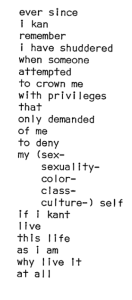Veronica Cunningham’s representation of the queer Latinx community in her poem “Ever Since” is integral to challenging perceptions of both queerness and Latinx by defining a space for its existence as an intersection, as it is often relegated to obscurity. Depicting Chicana queerness is transformative for Chicana and queer youth alike, as it allows for the construction of a queer future that is open to Chicana women. Queer stories challenge machismo in a unique way, as they help dismantle aspects of it depending on its portrayal of Latinos or Latinas. The depiction of a queer Latina rejects a heterosexual Latinx masculinity, and instead finds power in a Latinx culture that is not founded on the oppression of women. This can be seen in the lines “ you don’t have/ to tell anyone/ you’re a lesbian” which depicts the shame that is associated with female queerness not only in Chicana culture but also American. There is a juxtaposition between the shame affiliated with lesbianism and the praise she receives for not appearing visually Chicana. Cunningham depicts the opinions she is inundated with, “ you’re lucky/you don’t look Mexican” (19-20, 25-27). She is lauded for identities that align most closely with white heterosexual standards, and is told to suppress any identity that distances her from this standard. Cunningham states,

Lines 28-44 of Veronica Cunningham’s “Ever Since”.
She articulates the Chicana lesbian struggle by illustrating how significant one’s identities are to maintaining a sense of self, and how existing in a world that rejects those identities is so devastating. Her refusal to submit to white heteronormative ideals is transformative in that she is proud of her existence and would not choose to live without it. To love oneself in a world that deems your existence an abomination is a radical act. Her declaration of self-love in both her identities, lesbian and Chicana, defies the expectations of shame that society projects upon them.
Cunningham, Veronica. “Ever Since.” Capirotada (Spring 1977), pp. 30-35.
